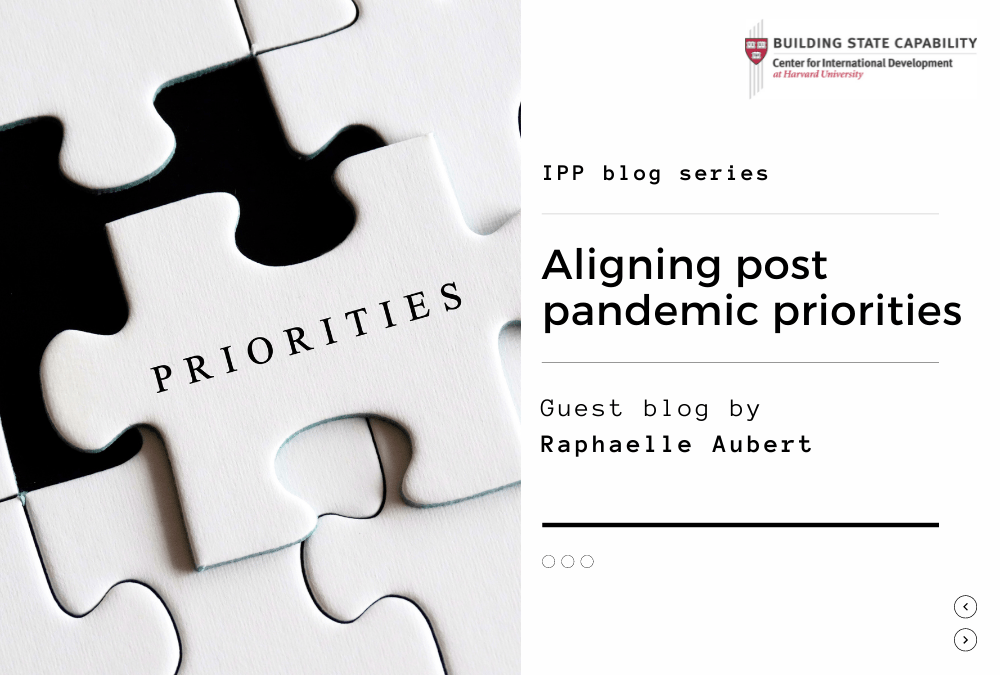Guest blog by Raphaelle Aubert
- What were your expectations of IPP Online when you signed up?
When I signed up for this course, I was eager to learn more about public policy, which is a field I would like to gain more exposure to within the World Bank Group and as I keep building a career in development.
Thanks to this learning journey, I feel much more confident to take additional steps in this direction. I also realize that I have learned a great deal about project management, leadership and other concepts that I can apply regardless of my field of expertise.
- What were some key learnings from this course?
My biggest realization is that implementation is the weakest link of public policy: it is crucial and yet too often overlooked.
I now understand why complex matters need to be tackled according to a specific PDIA methodology in order to fully integrate learning to the implementation process. The fishbone was very helpful in understanding how to deconstruct a problem and above all, how to start acting in spite of remaining uncertainties.
I have enjoyed learning about how leadership is building a coalition of empowered agents who become leaders themselves. Disappointing people at a rate that they can absorb is also something that I found eye opening.
The 4P Model was particularly interesting. It forces us to reflect on so many aspects of our personality and representation of the world. The podcasts with Rob Wilkinson were great and the live session was even better. I like that it provided us with concrete advice on how to have difficult conversations.
In general, I enjoyed the fact that we were exposed to both academic content as well as very concrete, actionable methods.
- What implementation challenge are you working on?
My policy implementing challenge consists of helping to improve the convergence of views at the Board of the World Bank Group – in a remote work setting – on post-COVID priorities.
- What progress did you make or what insights did you have about your problem through this process?
I was able to tackle several entry points of my fishbone.
We organized technical briefings of Board members by subject matter experts as well as regular check-ins on the response to the COVID crisis and the prioritization of resources.
To address, the lack of built-in space for informal exchanges among Board members, we organized a series of 4 half-day Board “mini-retreats” over a four-month period for Board members to exchange in a more candid and informal way about the current environment, how it is affecting the WBG and how it should shape the institution going forward.
My Management also approved a proposal I made to upgrade our Board IT system so we can improve the way we do business (organize and run Board meetings, manage knowledge, connect stakeholders, etc.) via the introduction of new technologies at the Board. An improved knowledge management system would also allow us to better identify and analyze Board members voting trends. This would permit us to better anticipate Board members’ reactions to proposal and potentially allow Management to refine such proposals accordingly ex-ante. We are currently trying to negotiate a significant increase in IT budget in order to implement this proposal.
I also got approval from my authorizers to implement a pilot I proposed for the Corporate Secretariat to have a more strategic engagement with Management. This implementation will require getting some buy in from additional authorizers throughout the organization and to follow up closely on implementation.

- What motivated you and how might this approach change (or not change) the way you tackle problems in the future.
This course was one of the best academic experiences I have had. I particularly enjoyed the live Q&A sessions. I was very impressed by Matt’s teaching and his ability to link a wide range of topics. I particularly appreciated that he was able to mix academic research with very concrete example from his own on-the-ground experience.
The group weekly meeting and assignments helped to keep me motivated. It felt reassuring and refreshing to discuss with people facing similar challenges – in particular during COVID. I realize these people were among the very few new people I met in 2020 due to the COVID crisis.
- How are you using, or will you use what you have learned in this course?
I really enjoyed using the PDIA checking tool. I felt like it was an energizing way to prepare for a new week, and I hope to keep using it going forward.
I also liked the advice about delegation and how it was presented as a key tool not only to reach higher collective performance but also to empower people and help them reach their full potential. I also appreciated how delegation is described as a two-way street. I particularly enjoyed learning that the agent/subordinate can be the initiator of the delegation. I think it is something essential to keep in mind while we seek to build a larger authorization space. It is particularly encouraging to know that at least part of the process can be under the control of the agent/subordinate.
- Do you have any words of wisdom to share with fellow PDIA practitioners around the world?
This is a great program that I would highly recommend. I am grateful for the opportunity to learn and remain stimulated intellectually in the time of COVID and home-based work. I feel empowered by what I have learned during this course and equipped to tackle the implementation of complex public policy challenges. I hope to take other HKS Executive classes to complete an executive certificate in public policy.
This is a blog series written by the alumni of the Implementing Public Policy Executive Education Program at the Harvard Kennedy School. Participants successfully completed this 6-month online learning course in December 2020. These are their learning journey stories.
